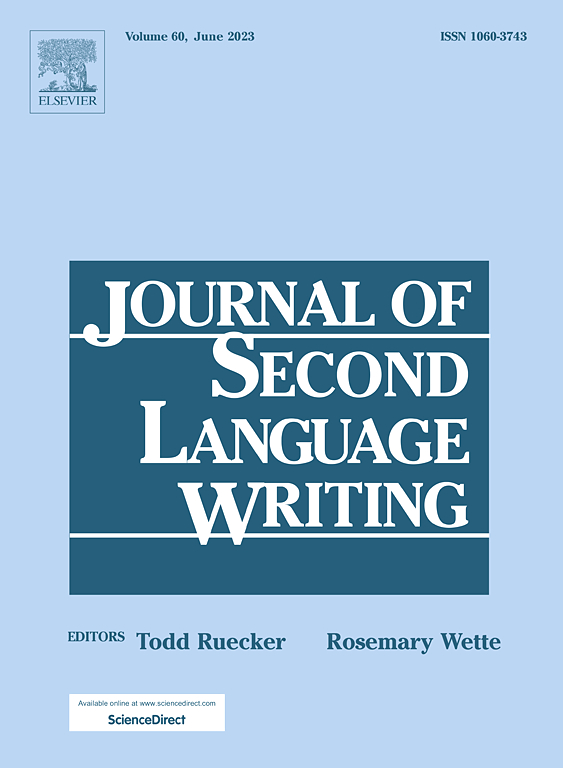第二语言写作中学生人工智能读写能力量表的开发和验证:一个特定领域的视角
IF 5
1区 文学
Q1 LINGUISTICS
引用次数: 0
摘要
人工智能(AI)正在改变教育格局,特别是在第二语言(L2)写作方面,重塑了学生学习和练习第二语言写作的方式。这一转变凸显了学生人工智能素养的重要性,它使学生能够利用人工智能工具的力量,更有效、更负责任地驾驭第二语言写作的复杂性。尽管具有重要意义,但关于第二语言写作中学生人工智能素养的研究仍然很少,而且明显缺乏测量、诊断和跟踪第二语言学生写作发展的工具。为了响应开发针对特定领域或学科的心理测量学验证量表的呼吁,本研究旨在开发和验证第二语言写作-学生人工智能素养量表(L2W-SAILS),以便教师和学生在第二语言写作中操作和评估学生的人工智能素养。在相关开创性研究的基础上,本研究提出了一个四维人工智能素养框架,包括“理解”、“使用”、“评估”和“伦理”。在此框架的指导下,我们编制了一份包含22个项目的学生人工智能素养自我报告问卷,并分别对435名和350名中国大学生进行了探索性和验证性因素分析。结果证实,L2W-SAILS是评估学生第二语言写作中人工智能素养的可靠测量量表,所提出的四维模型是学生人工智能素养的稳健表征。研究结果还有助于建立一个教学框架,为第二语言写作的人工智能辅助教学和学习提供信息。本文章由计算机程序翻译,如有差异,请以英文原文为准。
The development and validation of a scale on student AI literacy in L2 writing: A domain-specific perspective
Artificial Intelligence (AI) is transforming the educational landscape, especially in second language (L2) writing, reshaping how students approach the learning and practice of L2 writing. This shift has highlighted the importance of student AI literacy, which enables students to harness the power of AI tools and navigate the complexities of L2 writing more effectively and responsibly. Despite its significance, research on student AI literacy in L2 writing remains scarce, and there is a notable absence of instruments to measure, diagnose and track its development among L2 student writers. Heeding the call for developing psychometrically validated scales tailored to specific domains or disciplines, this study aims to develop and validate the L2 Writing-Student AI Literacy Scale (L2W-SAILS) for teachers and students to operationalise and assess student AI literacy in L2 writing. Building on relevant seminal works, this study proposed a four-dimension AI literacy framework, including ‘understanding’, ‘use’, ‘evaluation’, and ‘ethics’. Guided by this framework, a 22-item self-reported questionnaire on student AI literacy was developed and validated through exploratory and confirmatory factor analysis involving respectively 435 and 350 Chinese university students. The results confirm that the L2W-SAILS is a reliable measurement scale for assessing student AI literacy in L2 writing, and the proposed four-dimension model is a robust representation of student AI literacy. The findings also contribute to a pedagogical framework that informs AI-assisted teaching and learning of L2 writing.
求助全文
通过发布文献求助,成功后即可免费获取论文全文。
去求助
来源期刊

Journal of Second Language Writing
LINGUISTICS-
CiteScore
8.80
自引率
13.10%
发文量
50
审稿时长
59 days
期刊介绍:
The Journal of Second Language Writing is devoted to publishing theoretically grounded reports of research and discussions that represent a significant contribution to current understandings of central issues in second and foreign language writing and writing instruction. Some areas of interest are personal characteristics and attitudes of L2 writers, L2 writers'' composing processes, features of L2 writers'' texts, readers'' responses to L2 writing, assessment/evaluation of L2 writing, contexts (cultural, social, political, institutional) for L2 writing, and any other topic clearly relevant to L2 writing theory, research, or instruction.
 求助内容:
求助内容: 应助结果提醒方式:
应助结果提醒方式:


